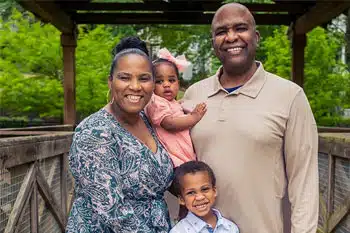
For many couples that contend with infertility and live out the daily struggle that comes with it, an important question emerges: do you want to be pregnant or do you want to be parents? It is difficult to determine when to forego fertility treatment and opt for adoption, especially after you have been trying for so long. Fortunately, this is a decision you can make in time. You just might need to take a few extra steps along the way.
Making the Decision to Become Pregnant
There are many reasons that couples struggle to become biological parents to a child. Research shows that the leading cause of male infertility is varicocele, a condition which affects sperm quality. In other cases, women have difficulty carrying a pregnancy. Age brings a decline in fertility, so women may also struggle when they decide to start a family later in life. Sometimes, doctors are unable to determine exactly what has caused the problem.
For many couples who struggle with infertility, it can be a big job to detect ovulation, take fertility drugs, and visit the clinic regularly. Additionally, in vitro fertilization (or IVF) is extremely expensive. While many women do eventually become pregnant through IVF, they may have to undergo the procedure several times, spending tens of thousands of dollars in the meantime. Fertility treatments often do not work, even when you have spent a lot of money in the hopes of becoming pregnant.
If you want to become pregnant, you may find that you have to overcome emotional roadblocks as well as financial ones. Many women who successfully become pregnant through IVF may experience a miscarriage. As one grieving woman said, “We cried and mourned the loss, and I don’t know if I’m over it yet. Since we couldn’t afford to try again, we had to find a new dream.” Often, these things just happen, and moving from infertility to adoption may provide the best source of happiness for the future.
Many people struggle with the idea of giving up on having a biological child. These couples may find comfort in realizing there is a reason for everything. Accepting this fact makes it much easier to embrace adoption as an option to grow your family if becoming pregnant simply is not possible.
Is having a biological child more important than becoming a parent? This is something only you can answer for yourself.

Making the Decision to Become Parents
Some couples determine that becoming a parent is much more important than having a biological child. They choose adoption as a way to grow the family and bring a child into the home. Of course, this is easier said than done. How do you know it is time to adopt?
It may be time to adopt a child if you feel at peace with the idea. If you choose adoption, it is a good idea that you take some time to grieve the idea of having a biological child. Otherwise, you may not treat an adopted child the way you would a biological one. When you accept your infertility, you can approach adoption with a positive attitude.
When you accept adoption, you can open your arms and your heart to an amazing child who needs a family. Of course, if you have not answered that question—“do you want to be a parent or have a biological child?”—you risk backing out of an adoption you were never even sure about. You also risk disappointing the birth mother who handpicked you to be the loving parents to her baby.
Working Through the Difficult Decision
To fully embrace adoption, it is recommended that you resolve any unaddressed issues related to infertility first and foremost. A counselor can help you determine if adoption is the next step that’s best for the two of you. After speaking with a professional, you may decide that you want to pursue additional medical options. You may find that returning to the idea of adoption later is helpful.
When you approach adoption, you mustn’t do it with the idea that adoption is inferior to having a biological child. It is not second best. Adoption helps you create a family, and that is your priority.
Some couples wonder if they could love a child that is not biologically theirs, but the truth is that a husband is not biologically related to his wife—and yet his love for her is undeniable. Love can exist where a genetic link does not, and that love can be intensely fierce. It can take your breath away to realize how much you love that child.
Ultimately, many people are unsure if they can accept a child that does not share their genes. To work through these feelings, it is smart to speak with a therapist and even other adoptive parents who have been through it all before. Many couples considering adoption realize that they still pass on characteristics and personality traits to their adopted children, and that they can certainly build bonds.
Nature and nurture both play a role in the way a child develops. When you adopt a child, you become his or her parent. You build a true family. It will not matter where your child came from—that is your child. The child you are given is the one you were meant to have.
So, when it comes to the question of whether you want to be pregnant or be a parent, you have to evaluate your readiness to face the challenges ahead. If you feel confident about your ability to become a parent via adoption, you have many resources to turn to. No matter what decision you land on, it could be the best choice you have ever made.
If you’re considering if infant adoption is right for you, we encourage you to contact us at Lifetime Adoption.
We’re happy to help you move forward with the adoption process when you’re ready.
To learn more, please call us at 1-800-923-6784.
As Vice President of Lifetime Adoption, Heather Featherston holds an MBA and is passionate about working with those facing adoption, pregnancy, and parenting issues. Heather has conducted training for birth parent advocates, spoken to professional groups, and has appeared on television and radio to discuss the multiple aspects of adoption. She has provided one-on-one support to women and hopeful adoptive parents working through adoption decisions.
Since 2002, she has been helping pregnant women and others in crisis to learn more about adoption. Heather also trains and speaks nationwide to pregnancy clinics to effectively meet the needs of women who want to explore adoption for their child. Today, she continues to address the concerns women have about adoption and supports the needs of women who choose adoption for their child.
As a published author of the book Called to Adoption, Featherston loves to see God’s hand at work every day as she helps children and families come together through adoption.






0 Comments